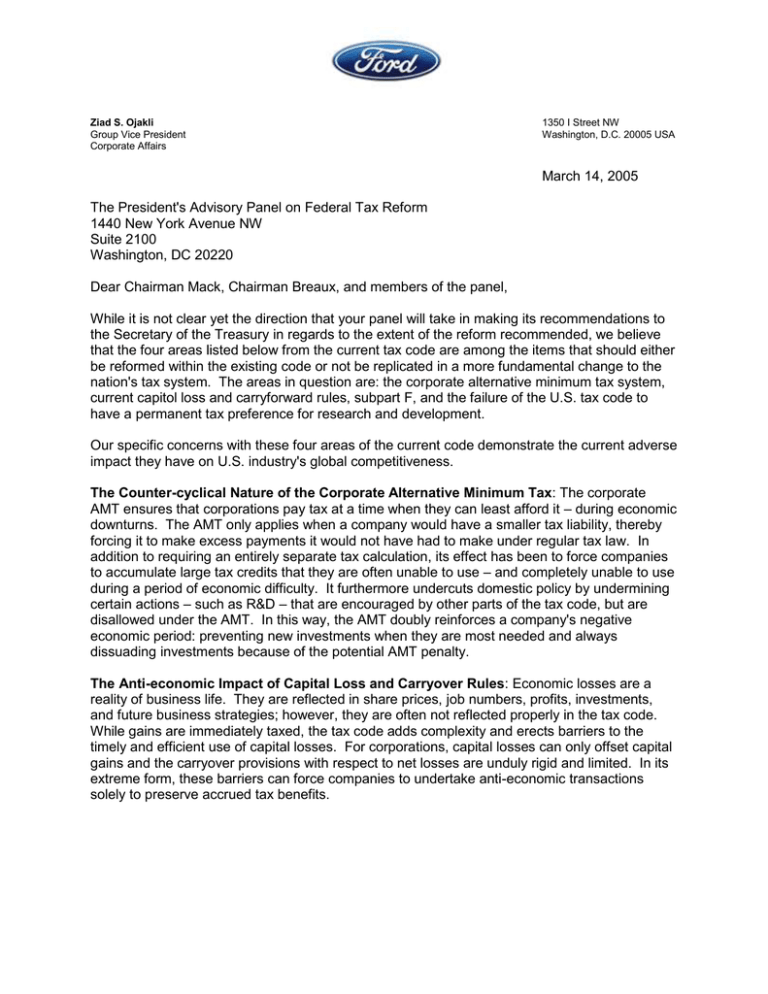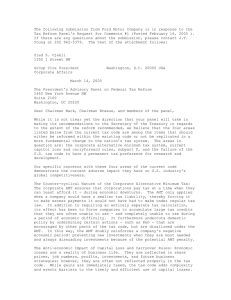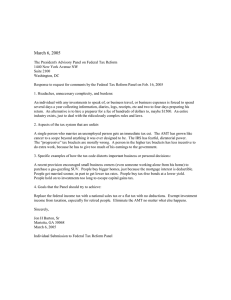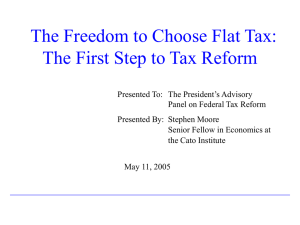March 14, 2005 The President's Advisory Panel on Federal Tax Reform
advertisement

Ziad S. Ojakli Group Vice President Corporate Affairs 1350 I Street NW Washington, D.C. 20005 USA March 14, 2005 The President's Advisory Panel on Federal Tax Reform 1440 New York Avenue NW Suite 2100 Washington, DC 20220 Dear Chairman Mack, Chairman Breaux, and members of the panel, While it is not clear yet the direction that your panel will take in making its recommendations to the Secretary of the Treasury in regards to the extent of the reform recommended, we believe that the four areas listed below from the current tax code are among the items that should either be reformed within the existing code or not be replicated in a more fundamental change to the nation's tax system. The areas in question are: the corporate alternative minimum tax system, current capitol loss and carryforward rules, subpart F, and the failure of the U.S. tax code to have a permanent tax preference for research and development. Our specific concerns with these four areas of the current code demonstrate the current adverse impact they have on U.S. industry's global competitiveness. The Counter-cyclical Nature of the Corporate Alternative Minimum Tax: The corporate AMT ensures that corporations pay tax at a time when they can least afford it – during economic downturns. The AMT only applies when a company would have a smaller tax liability, thereby forcing it to make excess payments it would not have had to make under regular tax law. In addition to requiring an entirely separate tax calculation, its effect has been to force companies to accumulate large tax credits that they are often unable to use – and completely unable to use during a period of economic difficulty. It furthermore undercuts domestic policy by undermining certain actions – such as R&D – that are encouraged by other parts of the tax code, but are disallowed under the AMT. In this way, the AMT doubly reinforces a company's negative economic period: preventing new investments when they are most needed and always dissuading investments because of the potential AMT penalty. The Anti-economic Impact of Capital Loss and Carryover Rules: Economic losses are a reality of business life. They are reflected in share prices, job numbers, profits, investments, and future business strategies; however, they are often not reflected properly in the tax code. While gains are immediately taxed, the tax code adds complexity and erects barriers to the timely and efficient use of capital losses. For corporations, capital losses can only offset capital gains and the carryover provisions with respect to net losses are unduly rigid and limited. In its extreme form, these barriers can force companies to undertake anti-economic transactions solely to preserve accrued tax benefits. The President's Advisory Panel on Federal Tax Reform Page Two March 14, 2005 The Foreign Income Inflator of Subpart F: An antiquated part of the tax code, Subpart F's excessively broad definition of foreign income inflates the domestic tax liability of US companies. Because our major global competitors don't treat foreign-earned income in a similar manner, American companies are greatly disadvantaged. The Investment Disincentive of the Temporary Research and Development Credit: R&D is inherently risky. The greater the certainty, the more likely businesses are to undertake it – this is the whole reason for the R&D tax credit. However, the credit – and the R&D it is supposed to foster – is seriously undermined by the credit's temporary nature. In a world environment that daily becomes more competitive, it is incumbent that America look for ways to maintain jobs and economic growth at home by increasing our global competitiveness. Too often America's workers and businesses are undercut globally by a domestic tax system that has not changed with the 21st Century's business climate. The results are fewer jobs, lower wages and profits, greater costs, more complexity, and tax-motivated transactions that undermine economic considerations as well as domestic policy priorities. We at Ford Motor Company congratulate you on taking a very difficult assignment. We appreciate the opportunity to communicate our concerns to the Panel and would be happy to provide any additional explanation or assistance that you feel would be helpful. Sincerely, Ziad S. Ojakli Group Vice President Corporate Affairs Ford Motor Company


